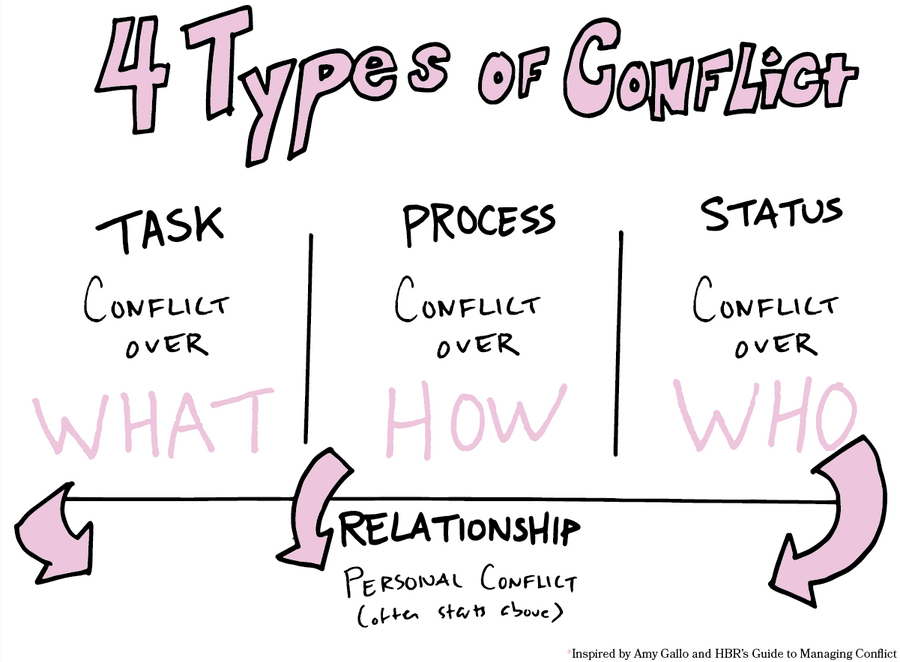The Science of Productive Conflict
Curated from: WorkLife with Adam Grant
Ideas, facts & insights covering these topics:
10 ideas
·21.7K reads
136
2
Explore the World's Best Ideas
Join today and uncover 100+ curated journeys from 50+ topics. Unlock access to our mobile app with extensive features.
The Science of Productive Conflict
Conflicts at home and work often seem different, but they have similar roots-- and similar remedies. In any relationship, conflict is inevitable-- but it isn’t unsolvable.
Every relationship in every team in every workplace has conflicts. We disagree about big decisions-- who to hire, how to improve a culture, whether to let people keep working remotely. We also disagree about smaller issues-- what time to meet, what to put first on the agenda, and how many pizzas to order-- or at least which toppings.
203
3.71K reads
The Devil Is In The Details
Extensive research shows that conflict has a big impact on cohesion and performance. The key issue, though, is not how often we have conflict-- it’s how well we manage it.
The goal isn’t to have less conflict; it’s to have the right kind of conflict. And to do that, we need to start by recognizing what we’re actually arguing about -- which is often not what we think we’re arguing about at all.
213
2.78K reads
Task Vs Relationship Conflict
- Conflict comes in multiple flavours. Walking down the ladder of inference can help with identifying what kind you’re having. Task conflict is disagreeing about the problem, the solution, or the decision—and that can be both necessary and productive.
- Relationship conflict is fighting about differences in personalities or values. And that’s sometimes unnecessary and usually destructive. In healthy partnerships and productive teams, we’re able to have task conflict without relationship conflict. But all too often, they get blurred.
228
2.6K reads
Status Conflict
Status conflict is about where we fit in the hierarchy that we're in together.
For example: "I think I'm higher in this informal status hierarchy than you. And you think you're higher in this informal status hierarchy than me or we're equal, but you're acting like you're higher."
190
2.17K reads
The Hidden Complexities
A conflict might sound on the surface, like basic communication trouble, but actually there are multiple kinds of conflict going on here.
When you're in the midst of conflict, it's often hard to take a step back and see what kind you're clarifying that can help you solve it.
182
1.99K reads
The Fault Lines
Research shows that fault lines are common within teams -- and between teams. You can have entire groups that dislike and disrespect each other. Which is not good for performance or morale.
Some fault lines are around status conflict-- there are tensions between groups around who’s running the show. Like sales trying to give orders to engineering or headquarters trying to dictate how a satellite office works. Other fault lines are around relationship conflict-- groups have clashing values and personalities. Like tensions between the old guard and new hires.
191
1.74K reads
Solution Aversion
Psychologists have demonstrated a pattern called solution aversion-- when people don’t like a particular solution, they often deny or dismiss the problem altogether. And if you can’t get people on the other side of a fault line to even recognize the problem, you’re not going to solve it.
Everything should be boiled down to a problem solution statement. And so anyone that has conflict should be able to identify the problem and then come to the table with a solution.
198
1.68K reads
A Solution Served On The Plate
Leaders often say, “Don’t bring me problems, bring me solutions.” They want people to be constructive-- not to whine or complain.
But if people can only speak up when they have a solution, you’ll never hear about the biggest problems-- which are too complex for one person to solve. And even if they do have a solution, it might be the wrong solution-- or they might be solving the wrong problem.
208
1.65K reads
Agree To Disagree, Respectfully
You don’t have to agree to disagree. You just have to agree to disagree respectfully.
The clearest sign of intellectual chemistry isn't agreeing with someone. It's enjoying your disagreements with them. Harmony isn’t the combination of identical sounds. It’s the pleasing arrangement of different tones, different voices, or different instruments.
210
1.71K reads
Harmony Isn't About Being The Same
Creative tension can make beautiful music.
In a culture that deals with conflict effectively, people aren’t afraid to bring their problems to the table. If you can agree on the problem, you have a better shot at finding a solution that works for everyone. And even if you don’t find that perfect solution, you’ve at least strengthened your ability to build consensus around the diagnosis of the problem.
200
1.7K reads
IDEAS CURATED BY
Spending a large amount of time with someone literally causes you to pick up their habits. Choose your friends wisely.
CURATOR'S NOTE
Conflict Management: Lessons From The Real World
“
Holden P.'s ideas are part of this journey:
Learn more about teamwork with this collection
How to create a positive work environment
Conflict resolution strategies
Effective communication in the workplace
Related collections
Similar ideas
Read & Learn
20x Faster
without
deepstash
with
deepstash
with
deepstash
Personalized microlearning
—
100+ Learning Journeys
—
Access to 200,000+ ideas
—
Access to the mobile app
—
Unlimited idea saving
—
—
Unlimited history
—
—
Unlimited listening to ideas
—
—
Downloading & offline access
—
—
Supercharge your mind with one idea per day
Enter your email and spend 1 minute every day to learn something new.
I agree to receive email updates





